- The Best Time of Day to Drink Bone Broth to Maximize Health Benefits
- 8 Ways to Increase Dopamine Naturally
- 7 Best Breads for Maintaining Stable Blood Sugar
- Gelatin vs. Collagen: Which is Best for Skin, Nails, and Joints?
- The Long-Term Effects of Daily Turmeric Supplements on Liver Health
- Could Your Grocery Store Meat Be Causing Recurring UTIs?
- Are You Making This Expensive Thermostat Error This Winter?
- Recognizing the Signs of Hypothyroidism
- 10 Strategies to Overcome Insomnia
- Could Artificial Sweeteners Be Aging the Brain Faster?
Psoriasis, Depression Often Go Hand in Hand: Study


Regardless of severity, patients with the often disfiguring skin condition psoriasis face an elevated risk for depression, new research suggests.
The depression risk may be driven more by concerns about appearance than by the actual status of the skin, said study author Dr. Roger Ho, an assistant professor in the department of dermatology at New York University School of Medicine.
“One small area of [psoriasis] involvement might mean a lot more to one person than an area three times the size for another person,” said Ho. “I think the location of skin lesions, such as lesions in a more visible area or lesions in an area that impairs daily functioning, might play a bigger role.”
Between 2 percent and 4 percent of North Americans have psoriasis, Ho said. The autoimmune disorder causes red, raised patches of skin covered with silvery-white scales. These patches usually appear on the scalp, elbows, knees, face, lower back, hands and feet.
People with psoriasis often struggle with other serious health concerns, including obesity, high blood pressure, diabetes and, ultimately, heart disease and/or stroke, Ho said.
To see whether depression is also among those ills, the research team sifted through disease data on more than 12,000 men and women collected between 2009 and 2012 by the U.S. National Health and Nutrition Examination Survey.
Participants were aged 18 and up, and all answered detailed questions regarding any history of psoriasis. Any recent history of depression was also noted.
After identifying psoriasis among nearly 3 percent of respondents and major depression among nearly 8 percent, the team found that almost 17 percent of psoriasis patients also had depression.
Although unable to determine which came first, the research team concluded that having psoriasis was “significantly associated” with also having major depression. And the researchers also observed that depressed psoriasis patients were more likely to be functionally impaired than depressed individuals without psoriasis.
However, Ho stressed the researchers can “only describe this as an association, not a direct causal effect.” But the researchers found that the link held up even after accounting for gender, age, and race, as well as lifestyle factors such as exercise, smoking and alcohol use, and obesity.
“I think further studies are necessary to definitively investigate recognizable risk factors that might predispose a psoriasis patient to depression,” said Ho.
The findings were published online Sept. 30 in the journal JAMA Dermatology.
Another dermatologist had a different take on the association between psoriasis and depression.
While profound concerns about self-image likely play a role, depression risk may also have deep physiological roots, said Dr. Gary Goldenberg, an assistant professor of dermatology at the Icahn School of Medicine at Mount Sinai in New York City.
“The more we know, the more it becomes clear that psoriasis is not just a skin disease, but a systemic condition associated with all sorts of other health issues,” Goldenberg said. “And this study just gives us a new level of evidence that this thinking is in fact correct.”
Noting it’s possible that depression and psoriasis share the same pathways, Goldenberg said the next logical step in psoriasis treatment is to see if the drugs used to treat psoriasis also have an impact on depression.
“We may ultimately find out that the same inflammatory mechanisms that contribute to psoriasis also exacerbate a chemical imbalance that leads to depression risk,” he said.
More information
There’s more on psoriasis at the American Academy of Dermatology.
Source: HealthDay
Copyright © 2026 HealthDay. All rights reserved.










